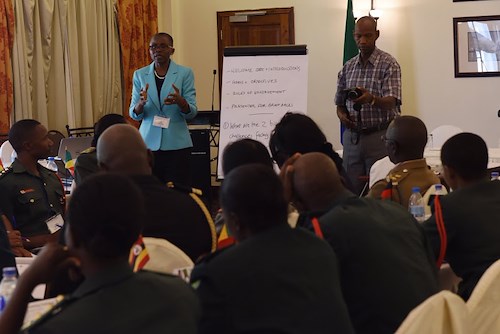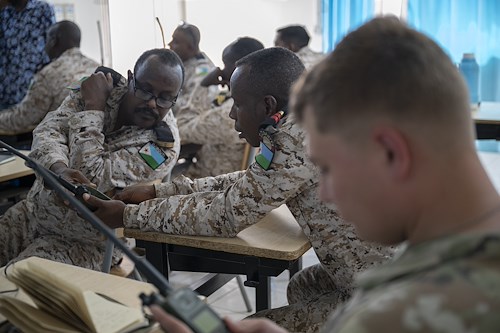Gallery contains 5 images
×
Photo 1 of 5
Gender Mainstreaming Seminar concludes after weeklong conference
Monde Muyangwa, Woodrow Wilson Center’s African Program director, leads a small group discussion during the Gender Mainstreaming Seminar in Arusha, Tanzania, May 19, 2015. Military personnel and key leaders from U.S. Army Africa and African partner nations talked about the challenges they face when integrating positive gender positive change, while also discussing tangible solutions. (U.S. Air Force photo by Staff Sgt. Maria Bowman)
Photo by: Staff Sgt. Maria Bowman
Photo 2 of 5
Gender Mainstreaming Seminar concludes after weeklong conference
U.S. Navy Cmdr. Kimberly Walz, Combined Joint Task Force-Horn of Africa Theater Security Cooperation deputy director, visits with an African military service member during a Gender Mainstreaming seminar May 19, 2015. This weeklong seminar focused on how to put words behind actions when it comes to providing equal opportunities for men and women. (U.S. Air Force photo by Staff Sgt. Maria Bowman)
Photo by: Staff Sgt. Maria Bowman
Photo 3 of 5
Gender Mainstreaming Seminar concludes after weeklong conference
Monde Muyangwa, Woodrow Wilson Center’s African Program director, brainstorms gender-related challenges with military personnel and key leaders from U.S. Army Africa and African partner nations during the Gender Mainstreaming Seminar in Arusha, Tanzania, May 19, 2015. The weeklong seminar brought together 90 attendees from 167 nations to talk about strategies and solutions to implement policies that will allow women and men to benefit equally while not perpetuating inequality. (U.S. Air Force photo by Staff Sgt. Maria Bowman)
Photo by: Staff Sgt. Maria Bowman
Photo 4 of 5
Gender Mainstreaming Seminar concludes after weeklong conference
Military personnel and key leaders from African partner nations, U.S. Army Africa and Combined Joint Task Force-Horn of Africa listen to opening remarks at a Gender Mainstreaming seminar May 19, 2015 in Arusha, Tanzania. The annual weeklong seminar covered three topics relating to equal opportunities for males and females, including integration resources, integration and leadership, and sexual gender-based violence. (U.S. Air Force photo by Staff Sgt. Maria Bowman)
Photo by: Staff Sgt. Maria Bowman
Photo 5 of 5
Gender Mainstreaming Seminar concludes after weeklong conference
Brig. Gen. J.C. Chengelela, a Tanzania People’s Defence Force commander, talks with Virginia Blaser, deputy chief of mission for the U.S. Embassy in Tanzania, before speaking to attendees at a Gender Mainstreaming seminar May 19, 2015. The seminar is an annual weeklong event that brings together U.S. Army leaders with counterparts and decision makers from militaries throughout Africa to promote and discuss gender integration-related topics. (U.S. Air Force photo by Staff Sgt. Maria Bowman)
Photo by: Staff Sgt. Maria Bowman
The Gender Mainstreaming Seminar, co-hosted by the U.S. Army Africa and Tanzania People’s Defence Forces, recently concluded its 2nd annual weeklong seminar that focused on integration resources, integration and leadership, and sexual gender-based violence.
During the seminar, guest speakers from the U.S. and several African countries talked about the integration of women into all levels of government and military, including successes, challenges and lessons learned. Approximately 90 military personnel from multiple nations, including Combined Joint Task Force-Horn of Africa, participated in this year’s event.
Gender mainstreaming is an international strategy for promoting equality between men and women. It is used to integrate gender concerns into all policies and programs. Achieving gender equity is an essential element of driving growth and socioeconomic development.
Virginia Blaser, deputy chief of mission for the U.S. Embassy in Tanzania, said women are soldiers and leaders in our military institutions, and hold positions of power in the civilian sector.
“We need more women to be entrepreneurs and executives, to be politicians and activists, and to be leaders who achieve their full potential,” Blaser said. “We have to remove these barriers because all our nations have a lot of really smart, capable citizens who can achieve great things. If we leave those women behind, we cannot move forward.”
Throughout the week, there were three interactive discussion panels, where leaders from 16 different countries talked about key barriers on gender mainstreaming, establishing equal opportunities, and how to remove gender discrimination.
Brig. Gen. J.C. Chengelela, Tanzania People’s Defence Force commander, began by addressing how vital the seminar was for all the countries to come together to discuss gender-related issues.
“This will allow for effective cross-talk and exchange of ideas on how we can equally integrate gender issues in our living environments for socio-economic, political and cultural development of our societies,” he said.
Monde Muyangwa, Africa Program director for the Woodrow Wilson Center and seminar facilitator, emphasized the importance of gender mainstreaming.
“We must put actions behind our words,” Muyangwa said. “It’s not enough to have good plans on paper—it’s time to make the plans, policies and strategies come to life.”
Lt. Col. Keary Johnston, Combined Joint Task Force-Horn of African deputy surgeon, said gender mainstreaming is a priority of the U.S. military, along with the African countries who attended the seminar.
“The conference was a sharing of best practices, lessons learned and ideas for the way forward to reach the goal of a military that reflects the society without any compromising of quality,” Keary said. “The U.S. military definitely has a long way to go to reach the same integration of many of our partner nations.”
During the first panel discussion, the groups talked about how all militaries experience issues relating to gender equality.
“People trust the military, and that comes with responsibility,” said Blaser. “You are game changers in your country. Learn from each other.”
The second panel discussion focused on integration and leadership. Brig. Gen. Birame Diop, chief of staff of the Senegal Air Force, said positive and proactive leadership is an essential component to successful integration efforts, regardless of a person’s job title or gender.
“Leaders have to have energy and strength to work on this issue,” Diop said. “You need conviction and a clear vision on what you want to do on this element and have a strategy. Once you have a clear vision, you have to create the right environment for people to perform at their best. Keep working on it and stay focused all the time. Do your best for your people; lead by example.”
Panel three centered on countering sexual gender-based violence.
“Gender Mainstreaming is not an end, but a strategy, an approach and a means to achieve the goal of gender equality,” said Muyangwa.
Maj. Gen. Darryl Williams, U.S. Army Africa commander, said he hopes the seminar attendees learned how to put their thoughts into actions.
“The United States is committed to gender mainstreaming,” he said. “We hope to continue the work begun here and expand upon it.”
The Gender Mainstreaming seminar enabled partner nation decision makers to determine actionable items for their respective militaries that further gender mainstreaming principles within their formations. Republic of the Congo Navy 1st Lt. Nathalie Mabanza, Archives and Documentation division chief said she hopes to use what she has learned during the seminar when she returns home.
“The seminar is very important, not only for the military, but all women.” said Mabanza. “The title of the conference, ‘Actions behind words,’ is very relevant for me; we’ve been talking about gender for a long time. I’m excited to use these tools for practicing tangible gender positive action.”
Michael Conteh, a professor from Michigan State University, encouraged seminar attendees to walk away with concrete, actionable ideas.
“The workshop does not stop here,” Conteh said. “If the things we have been doing have not been working, and things are changing in this direction, why not embrace that change? We need to rise above our thinking. We have come here and seen with our own eyes the progress that women have been making. Let’s add to the knowledge that we already know. Let’s subtract from the knowledge we thought was the right thing, but we realize is wrong. Let’s multiply as we go back into our regions the knowledge, which we have gained from here. That’s how we make progress.”



















